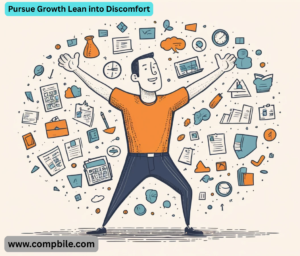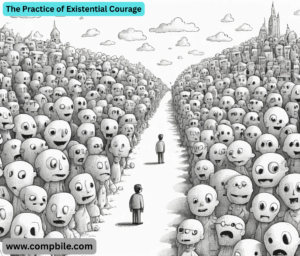How to Self Actualize Based on the work of psychologists like Abraham Maslow and Carl Rogers, and modern interpretations, here is a comprehensive guide on how to walk that path.
First, Understand What Self-Actualization Is (and Isn’t)
- It’s not about perfection. It’s about embracing your strengths and weaknesses while striving for growth.
- It’s not about constant happiness. It’s about experiencing the full range of human emotions authentically.
- It’s not a selfish pursuit. A self-actualized person often feels a deep connection to humanity and wants to contribute to its well-being.
- Maslow described self-actualization as the “full use and exploitation of talents, capacities, potentialities, etc.” These individuals often experience “peak experiences”—moments of intense joy, wonder, and connection.
The Pillars of Self-Actualization: A Practical Guide
Think of these as interconnected practices, not a linear checklist.
Cultivate Self-Awareness (Know Thyself)
- This is the non-negotiable foundation. You cannot become yourself if you don’t know who that is.
- Journal: Write down your thoughts, feelings, reactions, and dreams. Ask yourself tough questions: “What do I truly value?” “What makes me feel alive?” “What fears are holding me back?”
- Practice Mindfulness and Meditation: This trains you to observe your thoughts and emotions without judgment, creating space between a stimulus and your reaction. You stop being on autopilot.
- Seek Honest Feedback: Ask trusted friends, mentors, or a therapist for their perspective on your strengths and blind spots.
Embrace Acceptance (Of Self and Others)
- Accept Your Whole Self: Acknowledge your so-called “shadow” side—your flaws, insecurities, and past mistakes. They are part of you. Self-acceptance is the prerequisite for change, not its enemy.
- Practice Unconditional Positive Regard for Others: As Carl Rogers suggested, strive to accept people as they are without demanding they change to earn your approval. This reduces conflict and frees up energy for your own growth.
Live Authentically (Align Actions with Values)
- How to Self Actualize Identify Your Core Values: Is it honesty, creativity, freedom, family, service? These are your internal compass.
- Audit Your Life: Does your job, your relationships, and how you spend your free time align with these values? If not, where can you make adjustments? Authenticity is the courage to let your values guide your choices, even when it’s difficult.
Take Responsibility (Cultivate an Internal Locus of Control)
- Self-actualizers understand they are the authors of their own lives.
- to “What is this teaching me?” and “What is my role in this situation?”
- Own Your Choices: Every choice, including inaction, is a choice. Empower yourself by recognizing your agency.
Pursue Growth Lean into Discomfort
- Become a Lifelong Learner: Read widely, take courses, develop new skills, travel, and have conversations with people who have different viewpoints.
- Set “Being” Goals: Beyond external goals (get a promotion, lose weight), set internal goals (become more patient, cultivate more joy, develop courage).
Develop a Philosophical Take on Life
- Don’t Take Things Too Personally: Understand that other people’s actions are a reflection of their own inner state, not a measure of your worth.
- Appreciate the journey, with all its ups and downs. Find humor and wonder in the absurdity and beauty of existence.
Contribute to Something Greater Than Yourself
Self-actualization peaks when it extends beyond the self.
- How to Self Actualize Find Your Purpose: How can your unique talents and passions be used to serve others or a cause you believe in? This could be through your career, volunteering, mentoring, or creating art.
- Feel a Connection to Humanity: Recognize the shared human experience. Practice compassion and kindness.
- As you walk this path, these are the qualities you might notice emerging:
- Efficient perception of reality: They see the world clearly, not through a filter of denial or fantasy.
- Acceptance: Of themselves, others, and the unpredictability of nature.
- Spontaneity, Simplicity, and Naturalness: They are not overly concerned with social conventions that lack meaning.
- Problem-Centering: They are often focused on solving problems outside themselves.
- Need for Privacy and Solitude: They value their alone time to recharge and reflect.
- Autonomy and Independence: They are not dependent on others for their sense of self-worth.
- Continued Freshness of Appreciation: They find wonder in the ordinary, like a child.
- Peak Experiences: Moments of profound joy and connection.
- Profound Interpersonal Relationships: Their relationships are deep, but often few in number.
- Democratic Character Structure: They are humble and respectful of all people.
- Strong Ethical Sense: They distinguish between means and ends, and good and evil.
- Creativeness: In their own unique way, whether in their job, hobbies, or approach to life.
Important Caveats and Warnings
- Prerequisites Matter: Maslow’s hierarchy suggests basic needs (safety, food, shelter, belonging, esteem) must be reasonably met before self-actualization becomes a primary focus. It’s hard to focus on your potential if you are in survival mode.
- It’s a Journey, Not a Race: Be patient and compassionate with yourself. Some days you will feel connected and growing; other days you won’t. This is normal.
- Consider Professional Guidance: A good therapist or coach can be an invaluable guide in this process, helping you navigate blind spots and deep-seated patterns.
The Practice of Existential Courage
Instead of being paralyzed by these, self-actualizers use them as a catalyst.
- Practice: When you feel anxiety, don’t immediately try to numb it. Ask: “What is this anxiety revealing about my freedoms and responsibilities?” The pressure to choose a path (freedom) can be terrifying, but leaning into that terror is where growth lies. Embracing the fact that you are the ultimate author of your life’s meaning (even in a universe that might not have inherent meaning) is the ultimate act of self-creation.
Integrating the Shadow (A Jungian Concept)
- How to Self Actualize Your “shadow” is the part of your personality that you reject and repress because it doesn’t align with your ideal self. It contains not just “evil” but also repressed creativity, power, and passion. Self-actualization requires making the unconscious conscious.
- Practice: Pay close attention to your projections. ask: “Is there a part of me that is also arrogant, that I’m not allowing to express itself in a healthy way?” This isn’t about becoming arrogant, but about integrating that confidence and self-assurance so it doesn’t leak out in toxic ways. Art, active imagination, and dream analysis are powerful tools for this.
Cultivating Non-Attachment (Eastern Philosophy)
- This is often misunderstood as not caring. It’s actually the opposite. It’s caring deeply but not being enslaved by your desires, outcomes, or ego. It’s the ability to engage fully in the process without being devastated by a specific result.
- Practice: In any endeavor, set your intention, do the work, and then release your tight grip on the outcome. This applies to conversations (state your truth without needing to “win”), creative projects (make the art for its own sake), and relationships (love without needing to control the other person). This creates a profound sense of peace and resilience.
Transcending the Dichotomy of Self-Actuality
Maslow observed that self-actualized people resolve false dichotomies. They see beyond binary choices.
- Practice: When you find yourself thinking in “either/or” terms (e.g., “I must be either kind to others OR true to myself”), challenge yourself to find the “both/and” solution. How can you be both kind and authentically assertive? How can your work be both deeply meaningful and financially sustainable? This requires creative thinking and rejecting limited societal frameworks.
The Discipline of Expression
- How to Self Actualize Potential is not enough. Self-actualization demands that potential be expressed in the world. This is the move from inner awareness to outer creation.
- Practice: Don’t just feel creative—paint, write, build. Don’t just value connection—call a friend, express gratitude, be vulnerable. Don’t just think about your purpose—volunteer, mentor, start a project. Make a habit of translating an inner state into an outer action, no matter how small.
Advanced Exercises for Self-Exploration
The “If I Were Fully Me” Meditation:
- Sit in quiet reflection and ask yourself: “What would I do? How would I speak? How would I carry myself if I were not afraid of judgment, failure, or seeming foolish?”
- Don’t just answer intellectually; feel into the physical and emotional sensation of that state. Then, identify one tiny action you can take today that aligns with that feeling.
Values Inversion:
- List your top 5 values (e.g., Honesty, Growth, Family, Creativity, Freedom).
- Now, for each value, ask: “How is this value currently limiting me?” or “How could an excess of this value become a weakness?”
- Example: Value: Responsibility. Inversion: “It limits me because I never take time for myself. An excess makes me a control freak who can’t delegate.” This reveals the shadow side of your virtues and allows for a more integrated expression.
The Eulogy Exercise vs. The Resume Exercise:
- How to Self Actualize The Resume Exercise: List what you’ve done—achievements, skills, jobs. This is your external self.
- The gap between these two documents is the map of your journey toward self-actualization. How can you bring the qualities of your eulogy into your daily actions and resume?
Final, Essential Wisdom
- It’s a Dialectic, Not a Linear Path: You will constantly move between growth and regression, clarity and confusion, courage and fear. The goal is for the overall trajectory to be upward.
- Beware of Using “Self-Actualization” as a New Stick to Beat Yourself With. If you find yourself thinking, “I’m not self-actualized enough,” you’ve missed the point. It is a gentle, curious, and compassionate unfolding.
- Solitude is Non-Negotiable. You cannot hear the whisper of your own essence amidst the noise of the world. Regularly disconnect to reconnect with yourself.




